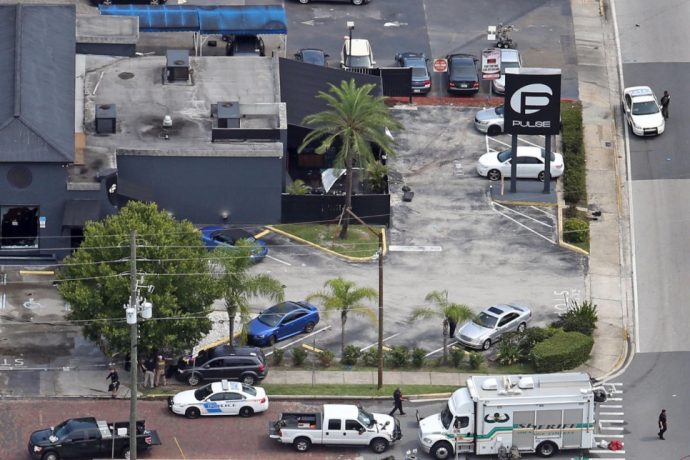Organizers of last month’s International Day Against Homophobia, Transphobia and Biphobia have published their report on this year’s celebrations around the world.
ISIS claims responsibility in Orlando mass murder
The American-born man who massacred dozens of people at a gay night club in Orlando, Florida, reportedly called 911 just before the attack and pledged allegiance to ISIS. CNN reported that the gunman had been interviewed by the FBI in 2013 and 2014 “but was not found to be a threat.” MSNBC reported that the shooter’s father said he had been upset by seeing two men kissing in public. ISIS later claimed responsibility through its news agency, Amaq. As TIME noted, “The mass shooting at the Pulse nightclub on Sunday came weeks after a top ISIS official issued a call for attacks throughout the world during the Islamic holy month of Ramadan, which began on June 6.”
Scott Lively’s new anti-gay strongman-crush: Hungary’s Viktor Orbán
Globe-trotting anti-gay activist Scott Lively, who has long been a fan of Russian President Vladimir Putin, has another strongman-crush. Last Monday Lively posted a reflection about Hungarian Prime Minister Viktor Orbán, who Lively calls a modern hero of the Christian faith. Orbán, called a “dictator” by Politico and a “right-wing demagogue” by Foreign Policy’s James Taub, has restricted the media and civil society, undermined judicial independence, and attacked religious freedom:
Orban seems to perpetually test the limits of European institutions — and his own. In 2011, parliament passed a law on the “Right of Freedom of Conscience and Religion,” which bore the same relation to freedom of conscience that the media law did to freedom of speech. The law required religious organizations to gain official approval through a two-thirds vote of parliament, thus creating separate classes of favored and non-favored faiths. Those that did not pass the threshold would lose tax advantages previously available to all churches. Hindus, Buddhists, Reform Jews, Methodists, and others failed to clear the bar. Hungary’s own Constitutional Court reinstated many of the groups. Orban, however, had made his implicit point: Hungary is a Christian nation.
Jordan: Article examines situation for LGBT people in time of rising fundamentalism
Suryatapa Mukherjee writes about the situation for LGBT people in Jordan, where homosexuality is not illegal, but where earlier this year a Lebanese rock band with an openly gay lead singer, Hamed Sinno, was banned from playing.
“It’s one of the only countries in the MENA (Middle East and North Africa) region that does not criminalise being LGBT+,” said Khalid in an interview. He is the founder of My Kali magazine, the first LGBT+ friendly webzine in Jordan, and one of the first in the MENA region. He identifies as gay. “Most of the countries in the MENA region want to reach that level. And it’s already given to us,” he added.
Yet, half-a-century since legalisation, LGBT+ rights in the country remain a gray area.
Madian Al Jazerah is a LGBT+ activist and the owner of Books@cafe, a LGBT+ friendly space. “Although there’s no law that criminalises, there is no law that protects the LGBT+ community,” he said in an interview. When there is physical abuse to the community, police treatment isn’t fair or equal, he said.
He mentioned several other legal peculiarities. There’s an elastic law according to which anything that tarnishes the values and morals of the community is illegal. So, meeting a woman alone and kissing her on her cheeks may be to totally acceptable in the capital Amman. The same may be unacceptable to the community elsewhere and so, illegal there. “This gets used a lot against the LGBT+ people,” he said.
Some activists believe that traditional Arab societies were more accepting of a fluid sexuality, but that “Western-imported labels” are hardening homophobia. Sinno told Daily Vice’s Venetia Rainey in April, “The political class is very quick to pander to the increasing religious fundamentalism around the region. I definitely don’t only mean Islam. There is also a rise in Christian fundamentalism in the Middle East.”
Caribbean: Court of Justice dismisses legal challenge to countries’ gay bans
The Caribbean Court of Justice (CCJ) dismissed a case brought by Jamaican activist Maurice Tomlinson challenging laws in Belize and Trinidad and Tobago that ban homosexuals from entering the countries, reports Rob Salerno at DailyExtra:
Tomlinson’s case hinged on the fact that, as a citizen of a member state of the Caribbean Community (CARICOM), his right to enter other member states was impinged by discriminatory laws in both states.
“I’m not surprised,” says Tomlinson over Skype from the Cayman Islands. “I know the CCJ was going to be cautious. I think they provided important clarification on the status of homosexuals in CARICOM. It’s a good first step.”
The court accepted testimony from Belize that its immigration law is not intended to prevent all homosexuals from entering the country, only those who engage in prostitution.
It also accepted evidence that Trinidad and Tobago does not bar homosexuals from entering in practice, despite what the law says. The court clarified that the law must be read in a way that is consistent with CARICOM treaties, meaning that homosexual CARICOM citizens cannot be barred entry to either country.
“It is now up to the international community to press for the repeal of this law so that it will be clear in relation to non-nationals of the CARICOM region,” Tomlinson said, noting that non-CARICOM citizens may still be legally barred from entering the two states even if immigration authorities do not block them in practice.
Tomlinson characterized the court’s action as “a good first step.” As Salerno reported earlier this year, Tomlinson is pursuing a number of legal challenges to anti-LGBT laws in the region, including colonial-era sodomy laws. Salerno wrote that “primarily US-based Evangelical Christian organizations have been active” in the region, “preaching that homosexuals are deviant and dangerous, and fomenting opposition to any expansion of LGBT rights.”
The “Queering Paradigms” conference was held in Grand Cayman this past weekend. It was sponsored by Canterbury Christ Church University in the United Kingdom. From a preview:
The conference wraps up Sunday with a panel on the topic of queer religion. Bee Scherer, founder of the “Queering Paradigms” conference series and director of the INCISE (Intersectional Centre for Inclusion and Social Justice) research institute at Canterbury Christ Church University, will give an introductory talk before the Bishop of Buckingham, Bishop Alan Wilson will speak on “Same-sex marriage and the queering project of Jesus.” He will discuss the U.K.’s experience with the introduction of same-sex marriage and describe the impact of changes in the U.K. marriage practice on both church and state. His talk will link this experience to an “emerging notion that queering is an activity mandated by various subversive elements in the teaching of Jesus,” according to the conference program.
United Nations: Russia leads effort to block language on decriminalization of homosexuality
A high-level meeting on AIDS was held last week without the participation of “nearly two dozen civil society organizations from five continents that provide services for LGBT communities, intravenous drug uses and others,” AP reported. The groups were blocked by Russia, Cameroon, Tanzania, and 51 Muslim countries.
In addition, Radio Free Europe / Radio Liberty reports:
Russia led an effort at the United Nations to strip language from an AIDS resolution that would have called for the decriminalization of homosexuality and drug use.
Russia was joined by Iran, Poland, and several Gulf states in blocking the decriminalization language from being included in a resolution adopted by the UN General Assembly on June 8 that called for ending the AIDS pandemic by 2030.
The UN’s Human Rights Council is scheduled to meet this week; BuzzFeed’s Lester Feder reports:
A group of five South American countries is expected to propose creating a new position at the United Nations devoted to investigating human rights violations against LGBTI people.
The position — a special rapporteur, or investigator — would answer to the United Nations Human Rights Council, which is beginning its next session of work in Geneva next week.
Bermuda: Chief Justice OK’s referendum on civil unions and marriage
Chief Justice Ian Kawaley gave a final go-ahead for a June 23 referendum that will ask voters to ask two questions: “Are you in favour of same-sex marriage?” and “Are you in favour of civil unions.” A few days earlier he had said during a hearing that, while it was contrary to “general principle” to hold a referendum on a topic that affects human rights, he didn’t think opponents made a convincing legal effort to stop it. The judge did order a polling place moved out of a church as a matter of fairness
Gambia: Nephew of president gets asylum in U.S.
Alagie Jammeh, nephew of Gambia’s viciously anti-gay president Yahya Jammeh, was approved for asylum in the U.S., reports the Washington Blade’s Michael Lavers. Alagie Jammeh argued that he would be at risk of persecution if he returne to the country based on a 2014 Facebook post in which he said “no one should be denied of their fundamental basic human rights because of their sexuality.”
Ukraine: Pride celebration in capital takes place without violence threatened by far right
Sunday’s LGBTI march in Kiev (or Kyiv) took place without major disruptions, thanks in part to a show of force by thousands of police officers. A far-right leader had earlier predicted that the day would result in a “bloody mess.”
Barbados: Attorney General opposes marriage equality
Attorney General Adriel Brathwaite told a church’s men’s gathering that the government “will not change the law” to allow same-sex couples to marry. Last year, cabinet minister Stephen Lashley warned against “going soft” on morality issues and said he didn’t support changing the law “to accommodate immoral behavior.”
Ireland: Law prof examines marriage equality actions in US, Ireland
Conor O’Mahony, a law professor at University College Cork, has published “Marriage Equality in the US and Ireland: How History Shaped the Future,” which will be published in the University of Illinois Law Review. From the abstract:
This paper has two main arguments, both of which are grounded in constitutional history: first, that the mechanism used for settling the marriage equality debate in each country was inevitable, and second, that it was appropriate to that country. The resolution of the marriage equality debate followed established patterns in the search for a decisive victory in a religious-moral controversy, and has close parallels with the abortion debate in each country. The fact that the legislative route has been used in every other country where marriage equality has been introduced, and navigates a middle road between the opposing disadvantages of litigation and referendums, does not mean that it would have been the appropriate route for either the U.S. or Ireland, where certain fundamental political disputes tend to be resolved through constitutional politics rather than ordinary politics.





